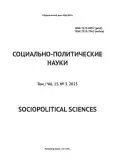The Paradigmatic Foundations of the Organization of Information Warfare in Modern Conditions
- 作者: Kaftan V.V.1, Kaftan V.V.2
-
隶属关系:
- Financial University under the Government of the Russian Federation
- Prince Aleksander Nevsky Military University of the Ministry of Defense of the Russian Federation
- 期: 卷 15, 编号 3 (2025)
- 页面: 195-204
- 栏目: Social and Political Philosophy
- URL: https://journals.eco-vector.com/2223-0092/article/view/687916
- DOI: https://doi.org/10.33693/2223-0092-2025-15-3-195-204
- EDN: https://elibrary.ru/TWAWCE
- ID: 687916
如何引用文章
详细
The purpose of the research. The article is devoted to the disclosure of the scientific and theoretical foundations of the organization of information warfare in modern conditions. The authors consider information warfare as a special form of complexly organized and purposeful activity of various subjects of social development, based on certain scientific theories and concepts that occupied a dominant position at a particular stage of human evolution and continue to remain relevant at the present time. The conclusions of the research. The paper reveals methodological tools for the study of the paradigmatic foundations of the organization of information warfare, which allows to reveal the causes of its functioning, to make a qualitative assessment of the expected results of information impact on the audience, to determine the content and specifics of the applied forms, methods and technologies of its implementation, as well as possible trends in further development.
全文:
作者简介
Vitaly Kaftan
Financial University under the Government of the Russian Federation
编辑信件的主要联系方式.
Email: kaftanvit@mail.ru
SPIN 代码: 4599-8580
Dr. Sci. (Philos.); Professor at the Department of Mass Communications and Media Business
俄罗斯联邦, MoscowVictor Kaftan
Prince Aleksander Nevsky Military University of the Ministry of Defense of the Russian Federation
Email: vick_472@mail.ru
SPIN 代码: 5648-3223
Cand. Sci. (Philos.); Lecturer at the 1st Department (Operational Art)
俄罗斯联邦, Moscow参考
- Bernays E. Propaganda. Moscow: Hippo Publishing LTD, 2010.
- Deleuze J., Guattari F. A thousand plateaus: Capitalism and schizophrenia. Yekaterinburg; Moscow: U-Faktoria; Astrel, 2010. 892 p.
- Delanda M. The new philosophy of society. The theory of assemblages and social complexity. Perm: Hyle Press, 2018. P. 40.
- Egorova-Gantman E. In the fog of war. Offensive military communication technologies. Samara; M.: Niccolo M Group of Companies, 2010. P. 22.
- Ignatov M.A. Nomadology J. Deleuze as a version of network methodology. Science. Art. Culture. 2016. Issue 3 (11). Pp. 39–41. (In Rus.)
- Castells M. The power of communication. Moscow: Publishing House of the HSE University, 2016. 563 p.
- Kuhn T. The structure of scientific revolutions. Moscow: Nauka, 1975. 288 p.
- Lakatos I. Falsification and methodology of scientific research programs. Moscow: Medium, 1995. 178 p.
- Lametri J.O. Man-machine. In: Essays. Moscow: Mysl, 1976. 507 p.
- Latour B. The reassembly of the social: An introduction to actor-network theory. Moscow: Publishing House of the HSE University, 2014. 381 p.
- McLuhan M., Fiore K. War and peace in the global village. Moscow: AST: Astrel, 2012. 219 p.
- Rakityansky N.M. The experience of system analysis or reflections on the book by E.V. Egorova-Gantman “In the fog of war. Offensive military communication technologies”. Information Warfare. 2010. No. 4. Pp. 98–99. (In Rus.)
- Sun Tzu. The art of war. Strategy and tactics of the winner. Moscow; St. Petersburg: Eksmo; Terra Fantastica, 2003. 792 p.
- Harman G. The four-pronged object. The metaphysics of things after Heidegger. Perm: Gile Press, 2015. 147 p.
- Nemeth W.J. Future war and Chechnya: A case for hybrid warfare. In: Thesis. Monterey. California: Naval Postgraduate School, 2002. Р. 58.
- Hoffmann F.G. Conflict in the 21st century: The rise of hybrid wars, Arlington: Potomac Institute for Policy Studies, 2007. P. 58.
补充文件










